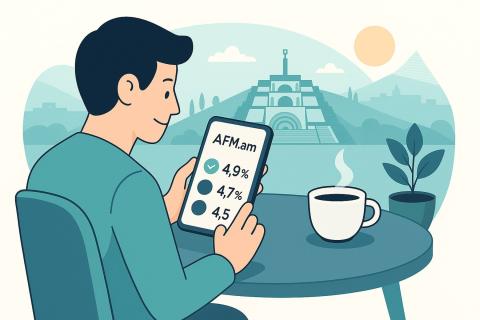What Is a Student Loan?

Latest news
FinnoWay Armenia 2025: International PLUS Forum to Be Held in Yerevan
How to Get a Gold-Backed Loan on the Best Terms in Armenia
How Banks Assess Borrowers in Armenia: What Determines Loan Approval
Which Armenian Bank Offers the Best Card for Russian Citizens?
Skyline in Yerevan: Armenia’s First “City Within a City”
The Best Euro Deposits in Armenia in Autumn 2025
Top Deposits in USD in Armenia in Autumn 2025
Top Deposits in AMD in Armenia in Autumn 2025
Profitable Promotions in Armenian Banks in October 2025
How Not to Fall Victim to Fraud in Armenia: Real Stories and New Tricks
Author
Roman Galstyan
Source
AFMTopic
Cash Loans, Artsakhbank, Byblos Bank Armenia, Evocabank, Converse Bank, Unibank, VTB Bank
A student loan is a targeted loan intended to cover the cost of higher education. The funds are transferred directly to the educational institution, and the student repays the loan gradually — typically after completing their studies.
In Armenia, a key feature of student loans is the government subsidy program. Under this initiative, part of the loan’s interest is subsidized, meaning the effective interest rate is lower than the market average. This makes student loans accessible even to those without a stable income.
To understand how both regular and subsidized student loans work, it’s important to know how and when the bank disburses funds to cover tuition fees.
How Are Education Loans Issued?
In Armenia, student loans are tailored to the specific conditions of the student’s university and the issuing bank.
There are two main approaches:
1. Loan for the Entire Study Period (Disbursed in Tranches)
Some banks approve the loan for the full duration of the program — for example, four years — with a maximum loan limit.
However, the full amount is not disbursed upfront. Instead, the bank issues the loan in tranches, per semester or academic year.
A tranche is a portion of the total loan that is released in stages, based on the payment schedule of the university. This way, you don’t pay interest on funds you haven’t used yet.
2. Loan for the Study Period Plus Repayment Term
Other banks structure the loan to include both the study period and an additional repayment period — for example, 6 more years after graduation.
- During the study period: only interest payments are required
- After graduation: repayment of the principal begins
The loan amount and repayment schedule depend on both the bank and the total cost of the education.
- If the university charges tuition monthly or per semester, the bank will follow that disbursement schedule.
- If the university issues annual invoices, the bank may release a full-year tranche at once.
This structure makes the loan flexible and secure:
- The student avoids paying interest on unused amounts.
- The bank ensures the funds are used strictly for education by sending payments directly to the institution.
To understand why a student loan is often more advantageous than traditional loans, let’s take a closer look at how it differs from standard consumer credit.
How Is a Student Loan Different from Other Types of Loans?
Student loans in Armenia come with unique conditions that make them more favorable for students compared to other financial products.
Compared to a Consumer Loan
- Consumer loans can be used for any purpose, and repayments of both interest and principal start immediately.
- Student loans allow you to pay interest only during your studies, with principal repayment starting after graduation.
Compared to a Mortgage
- A mortgage is secured by real estate and usually requires a large down payment.
- A student loan is unsecured and does not carry the risk of losing property.
Compared to an Auto Loan
- An auto loan is tied to the purchase of a specific vehicle, which is held as collateral by the bank.
- A student loan requires no collateral, and the funds are sent directly to the university.
Compared to a Credit Card
- Credit card interest begins accumulating immediately after the grace period ends, and payments are typically flexible but unstructured.
- A student loan has a fixed repayment schedule and preferential rates through government support, keeping overpayment to a minimum.
Key Advantages
- Student loans are more affordable than any other loan type, thanks to government interest subsidies.
- Top-performing students may receive even better terms, such as reduced interest rates or additional subsidies, making the loan even cheaper.
- This allows students to pursue their education without delay, without overburdening their family budget, and to start their careers earlier than if they waited to save up.
What Do You Need to Get a Student Loan in Armenia?
To qualify, you must meet the following criteria:
- Armenian citizenship
- Enrollment in an accredited university or college on a tuition-paying basis (bachelor’s, master’s, or residency programs)
- Age 16 or older (underage applicants typically require a guarantor — usually a parent)
- A document package that includes:
- Passport
- University agreement or enrollment confirmation with tuition cost and study duration
In most cases, a guarantor is required if the student does not have a personal income.
Banks Offering Student Loans at the Lowest Interest Rates
If your goal is to minimize interest payments, it’s worth looking into banks that offer the lowest effective rates. These banks allow you to finance your education at a much lower cost than traditional consumer loans.
| Bank | Effective Interest Rate | State Subsidy Program |
| Byblos Bank Armenia | 5.11% – 8.35% | Yes |
| Converse Bank | 6.16% – 7.28% | Yes |
| VTB Bank (Armenia) | 6.17% – 7.33% | Yes |
| Artsakhbank | 7.3% | Yes |
| Unibank | 9% – 9.4% | No |
By choosing a bank from this list, you’ll benefit from minimal overpayment and favorable loan conditions — especially if you have strong academic performance, which in some banks may qualify you for an even lower rate.
Banks Offering Student Loans with a Grace Period
If you want to study without a financial burden during the early years, look for banks that offer a grace period. During this time, you only pay interest, while repayment of the principal begins after graduation.
| Bank | Loan Term | State Subsidy Program |
| VTB Bank (Armenia) | up to 10 years | Yes |
| Converse Bank | up to 10 years | Yes |
| Artsakhbank | up to 10 years | Yes |
| Unibank | up to 10 years | No |
| Evocabank | up to 10 years | No |
Loans with a grace period allow you to defer principal payments and start repaying in equal installments after graduation, making your loan more manageable as you begin your career.
Step-by-Step Guide: How to Apply for a Student Loan
A clear sequence of steps will help you get a student loan quickly and without mistakes — on the best possible terms.
- Choose a bank – compare interest rates, loan terms, and whether a guarantor is required.
- Request a certificate from your university – it must indicate the tuition cost and expected graduation date.
- Submit your loan application – either online or at a bank branch.
- Wait for approval – provide a guarantor if needed.
- The bank transfers funds directly to the university – you won’t receive the money personally.
- Make interest payments on time – to keep your preferential terms and avoid penalties.
Smart Tips: How to Get the Best Student Loan Conditions
These simple tips will help you save on interest and make the most of your student loan:
- Maintain high academic performance – good grades may help you qualify for the lowest interest rates.
- Apply in advance – your university certificate should be recent (usually no older than 7 days).
- Make early repayments when possible – most banks don’t charge penalties, and it reduces your interest costs.
- Update your university documents on time – this is required before receiving the next loan tranche.
- Compare offers through AFM – to find the best terms and estimate your total repayment in advance.
FAQ: Frequently Asked Questions About Student Loans in Armenia
Q: Which bank offers the cheapest student loan?
A: The lowest effective interest rate is offered by Byblos Bank Armenia (from 5.11%), but this rate is available only under the government subsidy program.
Q: Can I get a student loan to study abroad?
A: No, state-supported student loans are available only for universities in Armenia.
Q: What happens if I drop out of university?
A: The grace period ends, and the loan switches to standard repayment terms.
Q: Can I pay only interest while studying?
A: Yes, principal payments are deferred until after graduation.
Q: Do I need a guarantor?
A: If you don’t have a steady income, a guarantor is required — usually a parent.
Q: Can I repay the loan early and save on interest?
A: Yes, most banks allow early repayment without penalties, helping you reduce the total overpayment.
Q: Does academic performance affect loan terms?
A: Yes, high-achieving students may receive additional subsidies from the government and qualify for lower rates.
Q: Can I apply for a second student loan for a master’s program?
A: Yes, if your first loan has been repaid, or if it was issued with an extension option under the state program.
Q: Will the money be transferred to my personal account for tuition payment?
A: No, the bank transfers the funds directly to the university to prevent non-educational use of the loan.
Conclusion
A student loan in Armenia makes it possible to pursue higher education — even if you don’t currently have the full amount needed to pay for tuition. The state subsidy program reduces the interest rate, and the grace period helps ease the financial burden during your student years.
To get the most out of your loan:
- Choose a bank with the lowest effective rate and comfortable repayment terms
- Maintain strong academic performance — it can actually lead to lower interest rates
- Use early repayment whenever possible to save on total interest costs
The earlier you apply for a student loan and begin your studies, the sooner you’ll graduate, start earning, and avoid wasting time saving up for tuition.
This approach allows you to complete your education without heavy debt and repay the loan comfortably after launching your career.
Banks like VTB Bank Armenia, Converse Bank, and Artsakhbank offer student loans with grace periods of up to 10 years, making it easier to focus on your studies now and begin repaying only after graduation.
And the lowest effective rate — starting from 5.11% — is available from Byblos Bank Armenia.
To choose the best option for your needs, compare student loan programs on AFM, calculate the total repayment in advance, and apply under the most favorable conditions.

How to Get a Student Loan in Armenia: Banks, Terms, and Tips

What Is a Student Loan?

How to Properly Refinance a Loan to Save Money?

Which Banks Offer Online Loans?

AFM – Armenia’s financial marketplace where everything is fair!






